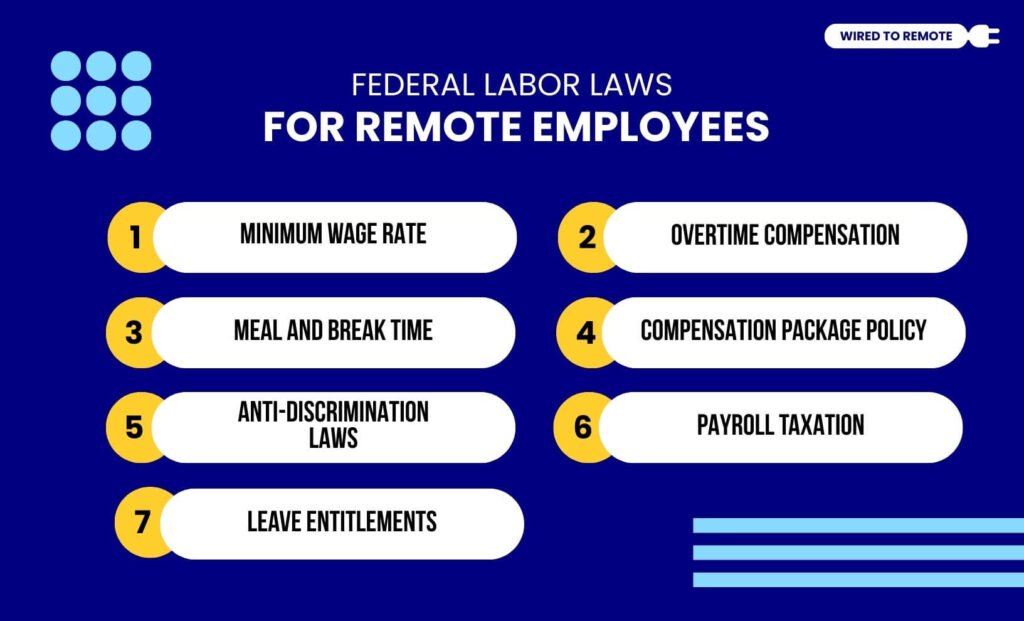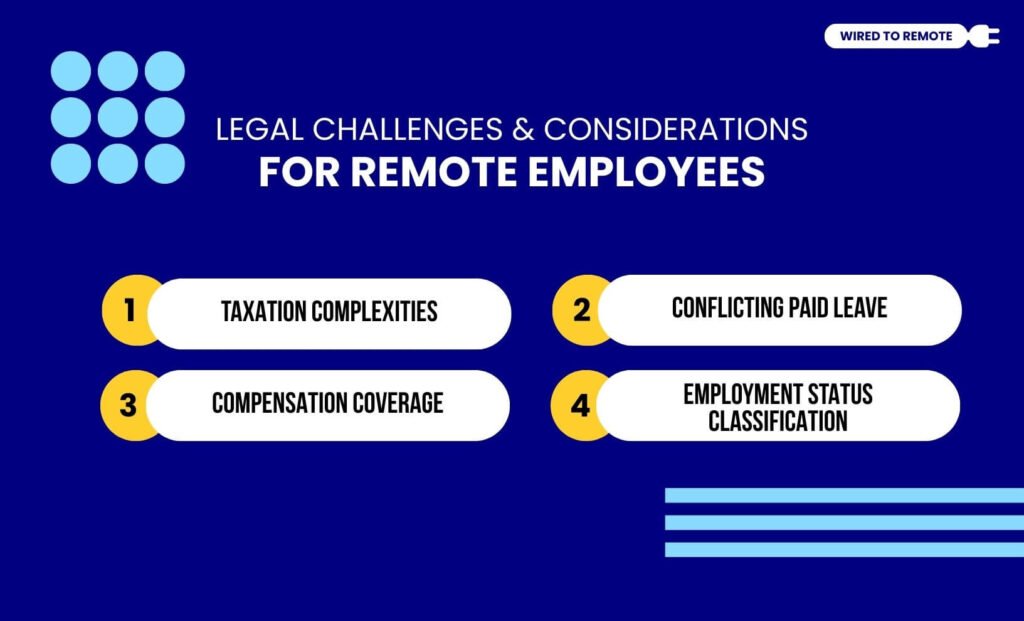- Labor laws help both remote employees and employers to adhere to the state regulations of employment.
- It also helps employees to ensure they are treated fairly at work and protects their rights against corporate exploitation.
- Labor laws for remote employees cover— minimum wage rate, overtime compensation, meal and break time, compensation package policy, anti-discrimination laws, payroll taxation, and leave entitlements.
With remote work becoming the new norm, diverse aspects of corporate are changing.
That is, from office culture to employment laws, remote work is bringing in a transformation in almost everything.
And, as employees are shifting from traditional offices to a remote corporate culture, knowing about the labor laws is quite vital.
So, they can protect their rights and compel their employers to perform their duty.
Moreover, the employment laws provide a clear legal framework for both remote employees and employers to follow. So, they can comply with the regulations.
But the question is— “How to know about the labor laws for remote employees?”
Well, no need to look any further, I have got you covered. In this blog, I am going to explore everything related to the legality of remote work by focusing on—
- Importance of labor laws for remote workers,
- Major legal regulations and laws,
- Challenges faced by remote workers, and more.
So, come dive right into it!
Why Do Remote Employees Need Labor Laws?
First things first, labor laws are specifically designed to protect laborers from being exploited by employers.
Whether it is for office workers or remote employees, these laws protect their interests and rights from corporate exploitation.
So, providing a legal framework that values both employee and employer interests.
Since remote work culture is different than on-site work culture, the labor laws for remote employees are different.
So, these prioritize the well-being of virtually connected workers.
Moreover, these laws offer an outline for minimum wage, overtime charges, leave and break times, health needs, safety requirements, compensation coverage, and more.
Federal Labor Laws For Remote Employees

Even though the federal labor laws apply across the entire U.S, some technicalities under these laws vary from state to state.
So, the state authorities can determine the values for the outlined structure based on the state’s socio-economic condition.
Moreover, among the other federal labor laws, the Fair Labor Standards Act (FLSA) covers the labor laws for both public and private remote employees. So, it covers—
1. Minimum Wage Rate
Firstly, the law entitles the remote workers to the minimum wage rate for their work irrespective of their locations.
That is, employers must pay the remote workers the minimum pay without changing the pay scale based on their location.
2. Overtime Compensation
Moreover, the law states that remote workers should be compensated for overtime work at the hourly rate.
So, when the employees work over 40 hours a week, they should be compensated for the extra hours of work.
3. Meal And Break Time
Unlike on-site work, remote employers do not need to provide meals or more than 30 minutes of break time to remote employees.
So, the workers can take their meal within the work hours. Also, the law states that the short 5-20 minute breaks should be considered within the compensable hours.
4. Compensation Package Policy
Since the compensation package structure is determined by state labor laws, the federal law does not cover the package policy.
So, only the state authorities can determine the compensation package rate for remote workers. Along with this, they can decide the compensation for work-related injuries in remote firms.
5. Anti-Discrimination Laws
In addition to this, the laws strictly prohibit any kind of discrimination and employee harassment. So, protecting the employee rights and providing a safe workplace.
6. Payroll Taxation
Moreover, the law clearly states that the employer needs to be aware of the state’s taxation policies, such as income tax and unemployment insurance.
So, both the remote workers and the employers can comply with the state-specific regulations. Avoiding legal issues with the taxation policies.
7. Leave Entitlements
Finally, the laws entitle the remote workers to paid leave. So, under the Family and Medical Leave Act, each worker can have up to 12 weeks of unpaid medical leave.
Moreover, female remote workers are entitled to at least 6 weeks of Maternity Leave. This way, the companies can prioritize the well-being of their employees.
What Are The Employee Rights Of Remote Workers?
In addition to knowing about the labor laws, remote workers must know about their rights to ensure they are treated fairly by remote firms. Some of these rights are—
- Getting paid the salary on time.
- Working for defined work hours.
- Getting paid leave and public holidays.
- Receiving promised reimbursements from the company.
- Getting privacy and employee security.
- Protection from discrimination and harassment.
Legal Challenges And Considerations For Remote Employees

When remote employees and employers reside in different states, they both face some unique remote challenges. Some of these common challenges for remote workers include—
- Taxation Complexities: Firstly, different states have different taxation policies. So, employers need to adhere to the taxation regulations of the state where the employee is residing.
- Conflicting Paid Leave: Moreover, some states entitle workers to paid sick leave, whereas others don’t. So, employers need to abide by the rules of paid leave in the state where the employee is working.
- Compensation Coverage: Also, compensation coverages might clash due to different policies of states. But employers must follow the structure provided by the state of the company, irrespective of the primary location of the worker.
- Employment Status Classification: Finally, employers need to classify the status of employment clearly. This way, they can avoid legal disputes around misclassification and taxation issues.
Things To Keep In Mind To Legally Work Remotely
Now that you know how labor laws for remote workers play an important role, you can follow them to ensure you are treated fairly.
Moreover, by adhering to the legal framework, both remote employers and employees can avoid legal disputes. So, working under a legal and safe firm policy.
But as a remote employee, it is your duty to ensure you are legally working remotely. So, here are some considerations—
- Ensuring you have the legal permission to work remotely from your residing state.
- Adhering to the remote labor laws of your state as well as the company’s state.
- Understanding the obligations before signing on the work.
This way, it is easier to work remotely without getting involved in legal disputes. So, with this guide, you can freely work from anywhere.
FAQs
It is not illegal to work remotely or work from home in the federal states. So, anyone residing in the States can start working remotely.
Legally, employers from the State have the right to monitor their employees. So, they can monitor your work when you are working using the company devices. But in some specific states, monitoring without consent is illegal and punishable by law.
Some of the components of a work-from-home policy include—
• Employee eligibility criteria,
• Approval and request processes,
• Defined work hours,
• Leave policy and public holidays,
• Data security guidelines,
• Performance expectations,
• Reimbursement policy for promised projects.





Leave A Comment